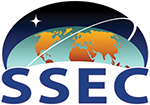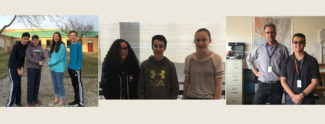Winners of GOES-16/17 Virtual Science Fair Announced
The Cooperative Institute for Meteorological Satellite Studies (CIMSS) Education and Public Outreach (EPO) Office at the University of Wisconsin-Madison recently announced the winners of its inaugural GOES-16/17 Virtual Science Fair. Teams of middle school and high school students from Massachusetts, New Jersey, and New Mexico were awarded first place for their projects using geostationary weather satellite data.
Two teams tied for first place in the middle school category. The team from Auburn Middle School in Auburn, MA studied the impact of data from the Geostationary Operational Environmental Satellite (GOES) when forecasting weather in the Upper Mississippi Valley region. The other team from Medford Memorial Middle School in Medford, NJ compared rainfall amounts collected in a rain gauge with brightness temperature data from GOES-16.
The winning high school team from Santa Fe High School in Santa Fe, NM studied tropical cyclone activity using the GOES data to test a hypothesis about a correlation between yearly solar flare X-ray irradiation and worldwide yearly tropical cyclone activity.
The students, along with their teacher/coach, won invitations to watch the GOES-T satellite launch – though they will be responsible for their own travel costs. The invitations allow them each to bring three guests and explore Kennedy Space Center for three days (the day before, day of, and day after the launch). In addition, each student will receive a $25 gift card, while teachers will receive travel support to attend and make a presentation about their students’ research at the American Meteorological Society (AMS) meeting in 2020.
The Virtual Science Fair was devised as a novel way for students and teachers to learn satellite meteorology, participate in a small research project, and share what they learned. To participate in the fair, small teams of students, with the guidance of a teacher/coach, created and submitted a scientific poster about their research, along with a video describing their poster and work.
Margaret Mooney, director of the CIMSS EPO office, described the Virtual Fair as the “next step” in the GOES-R Education Proving Ground program developed at CIMSS. Echoing the GOES-R program theme of launch readiness, Mooney said that they wanted teachers to be “launch ready” as well – to be able to explain to their students the importance and benefits of this weather satellite program.
“We wanted the educators to be ready to work with the data,” said Mooney. “Now that the satellites are in orbit and the data is coming down, why not get students to use the data?”
To see the winning projects, visit the GOES-16/17 2019 Virtual Science Fair website.
Funding for the GOES-R Virtual Science Fair is provided by the GOES-R program.

